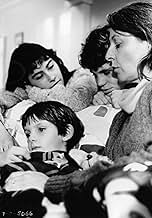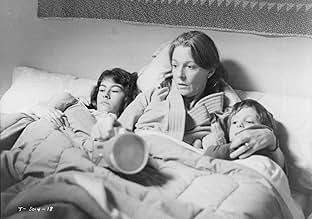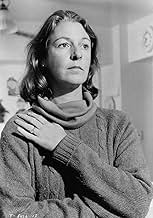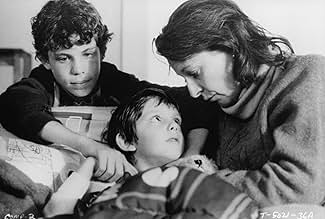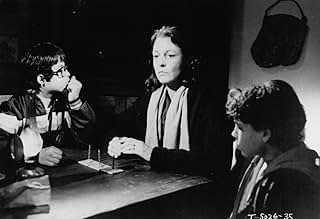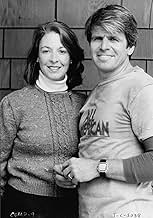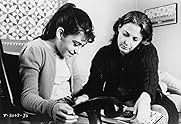IMDb-BEWERTUNG
6,9/10
7592
IHRE BEWERTUNG
Das Leben einer amerikanischen Vorstadtfamilie ist nach einem Atomangriff gezeichnet.Das Leben einer amerikanischen Vorstadtfamilie ist nach einem Atomangriff gezeichnet.Das Leben einer amerikanischen Vorstadtfamilie ist nach einem Atomangriff gezeichnet.
- Regie
- Drehbuch
- Hauptbesetzung
- Für 1 Oscar nominiert
- 2 Gewinne & 6 Nominierungen insgesamt
Rossie Harris
- Brad Wetherly
- (as Ross Harris)
William G. Schilling
- Pharmacist
- (as William Schilling)
Empfohlene Bewertungen
All of the comments i have read about this film focus on it's bleakness, on it's difficultly - due to subject matter, and many of them also quite rightly applaud the performance of Jane Alexander in the Central role. What none of them mention, and what seems so clear to me, is that this is a film that could only have been made by women.
There is no BIG EVENT here. No mass hysteria, violence, rape, disfigurement or any of those other factors that are paraded as horrifying in the majority of Nuclear War films - I am thinking specifically of Threads and The Day After Here.
In Testament we actually see humanity. We see how one family, one community copes with the devastation of just that - their family and their community.
This is what is so tragic, compelling and ultimately horrifying about this film. It is not a panache, it is not a broad canvas. It is about people not about issues and as such the humanity shines through.
I am not saying the other films aren't powerful in their way. They are - and both Threads and The Day After gave me nightmares. But Testament was so far beyond them in terms of simple courage and purpose. There was no grandiose, no glamour or tacked on love story. This was not hollywood, was life or the end of it, and all the more frightening for it.
Testament is one of the main reasons why we should see more women making politic films - and perhaps running a few more countries.
There is no BIG EVENT here. No mass hysteria, violence, rape, disfigurement or any of those other factors that are paraded as horrifying in the majority of Nuclear War films - I am thinking specifically of Threads and The Day After Here.
In Testament we actually see humanity. We see how one family, one community copes with the devastation of just that - their family and their community.
This is what is so tragic, compelling and ultimately horrifying about this film. It is not a panache, it is not a broad canvas. It is about people not about issues and as such the humanity shines through.
I am not saying the other films aren't powerful in their way. They are - and both Threads and The Day After gave me nightmares. But Testament was so far beyond them in terms of simple courage and purpose. There was no grandiose, no glamour or tacked on love story. This was not hollywood, was life or the end of it, and all the more frightening for it.
Testament is one of the main reasons why we should see more women making politic films - and perhaps running a few more countries.
I first saw "Testament" when it came out in 1983. At the time, I was 30 years old and the mother of a two year-old son. As a child of the Cold War years, I have always been interested in films about that most unthinkable event: the detonation of a nuclear bomb or bombs somewhere on our fragile planet. If you are, too, you must watch "Testament" (and another small gem of a slightly earlier era called "Fail-Safe.")
This is a wonderful film that slowly, unbearably reveals what happens in the small, idyllic town of Hamlin after a full-scale nuclear exchange between the superpowers wipes out a large part of America. The town and its citizens, including the Weatherly family, escape initial destruction. But slowly the bonds that hold western societies together (electricity, communication, fresh food, medical help) begin to fray and ravel. There is no television. Batteries to power transistor radios suddenly become more valuable than $20 bills in a town where, suddenly, there's nothing left to buy.
The story and scenes are permeated with a sense of enormous loss. A family loses its husband and father who simply walked out the door, waving a breezy goodbye one morning, and disappeared into the holocaust. All his wife, Carol, and two children have left of him are their memories and some flickering images on home movies, glimpses not just of a lost loved one, but of a lost -- and loved -- world.
A school play about the Pied Piper was in rehearsal before catastrophe hit, and, desperate to recapture some normalcy and to divert the children's attention from a reality to horrible to contemplate, the town decides to go on with the show.In the earlier rehearsal scenes, life was normal, the future shone brightly in the children's faces. Now, as the parents watch the performance, they see no future for these beautiful innocents. To me, this is the key scene of the film: the contrast between what these people once had and what has been lost is staggering. It makes you want to go outside, smell the air, marvel at the full supermarket shelves and the working telephone lines. (This is a gift that the movie gives its audience which goes far beyond entertainment and approaches enlightenment.)
Beyond the wonderful writing, direction and performances, I love the tiny touches in the story. For example, there's the foreshadowing, the implicit warning contained in the presence of a minor character, a little Japanese boy with Down Syndrome who is cared for by the town after his father dies. The child's name is Hiroshi. Pay attention, the script commands us in a whisper: Hiroshima happened once, but it can happen again, and it can happen to you as well as "them."
In the end, the movie is a testament to this undeniable fact, a testament to the stupidity of men who continue building ever-larger, more lethal means of mass destruction, and finally, a testament to the strength of mothers like the character of Carol Weatherly who have no choice but to love and protect their children no matter what comes.
This is a wonderful film that slowly, unbearably reveals what happens in the small, idyllic town of Hamlin after a full-scale nuclear exchange between the superpowers wipes out a large part of America. The town and its citizens, including the Weatherly family, escape initial destruction. But slowly the bonds that hold western societies together (electricity, communication, fresh food, medical help) begin to fray and ravel. There is no television. Batteries to power transistor radios suddenly become more valuable than $20 bills in a town where, suddenly, there's nothing left to buy.
The story and scenes are permeated with a sense of enormous loss. A family loses its husband and father who simply walked out the door, waving a breezy goodbye one morning, and disappeared into the holocaust. All his wife, Carol, and two children have left of him are their memories and some flickering images on home movies, glimpses not just of a lost loved one, but of a lost -- and loved -- world.
A school play about the Pied Piper was in rehearsal before catastrophe hit, and, desperate to recapture some normalcy and to divert the children's attention from a reality to horrible to contemplate, the town decides to go on with the show.In the earlier rehearsal scenes, life was normal, the future shone brightly in the children's faces. Now, as the parents watch the performance, they see no future for these beautiful innocents. To me, this is the key scene of the film: the contrast between what these people once had and what has been lost is staggering. It makes you want to go outside, smell the air, marvel at the full supermarket shelves and the working telephone lines. (This is a gift that the movie gives its audience which goes far beyond entertainment and approaches enlightenment.)
Beyond the wonderful writing, direction and performances, I love the tiny touches in the story. For example, there's the foreshadowing, the implicit warning contained in the presence of a minor character, a little Japanese boy with Down Syndrome who is cared for by the town after his father dies. The child's name is Hiroshi. Pay attention, the script commands us in a whisper: Hiroshima happened once, but it can happen again, and it can happen to you as well as "them."
In the end, the movie is a testament to this undeniable fact, a testament to the stupidity of men who continue building ever-larger, more lethal means of mass destruction, and finally, a testament to the strength of mothers like the character of Carol Weatherly who have no choice but to love and protect their children no matter what comes.
I've seen this movie twice, and "Testament" still lingers in my brain as an atom bomb movie. And it's not really about that - the bomb comes and goes fairly quickly - but more about how a community comes together during the aftermath. It's kinda funny how the movie flips from TV commercial suburban life to sobering angst, where precious resources are rationed and then dry up completely.
But it is a powerful movie, thanks largely to the characters and the performances. Even as death loiters nearby and the losses keep piling up (god, this movie just keeps taking), there's Jane Alexander hanging on til the bitter end. Despite the climate of that period in the early '80s, subtlety is really this movie's strong suit. Characters die off, one by one, but it's never staged or theatrical. Very subdued; we'll just get a single image and put the horrifying pieces together.
It's kinda hard to believe there's a (tiny) ray of hope at the end of this thing. But man, it's a punishing journey.
7/10
But it is a powerful movie, thanks largely to the characters and the performances. Even as death loiters nearby and the losses keep piling up (god, this movie just keeps taking), there's Jane Alexander hanging on til the bitter end. Despite the climate of that period in the early '80s, subtlety is really this movie's strong suit. Characters die off, one by one, but it's never staged or theatrical. Very subdued; we'll just get a single image and put the horrifying pieces together.
It's kinda hard to believe there's a (tiny) ray of hope at the end of this thing. But man, it's a punishing journey.
7/10
I've been a fanatic of disaster movies and post-apocalypse Sci-Fi for practically my entire life already, but I have deliberately been avoiding the actual "nuclear bomb impact" films. There were several of these released during the early 80's. Apart from "Testament", there's also "The Day After", "Threads", "Letters from a Dead Man" and "When the Wind Blows". All these aforementioned films have high ratings, favorable reviews and impeccable cult-reputations. So, then why haven't I seen them before? Because the impact of these films, pretty much like the H-bomb itself, is downright devastating, and yours truly is a very sensitive person!
There's a world of difference between sci-fi films set in post-nuclear wastelands, where a handful of human survivors drive around in dune buggies and battle each other over a tank of fuel, and actually witnessing the long and excruciatingly painful process which leads to the complete extinction of mankind. And even though writer Carol Amen and director Lynne Littman absolutely restrain from turning "Testament" into a sentimental tearjerker, the film is inescapably harrowing, and numerous sequences caused me to burst into tears.
The story takes place in the peaceful little community of Hamlin, a suburb of San Francisco, and introduces the model family of Tom and Carol Wetherly and their three children. Everything they love and worked for literally vanishes in a bright and sudden flash. Hamlin's unusual geographical location, in a sort of mountain bowl, safeguards the town from instantaneous destruction, but this rapidly proves to be a curse instead of a blessing. Without any form of sensationalism, or raising idle hope, Littman depicts how the townspeople and loved ones succumb around Carol, whilst radio contact with the rest of the world fades even further away.
The aptly titled "Testament" is a beautiful, frustrating, haunting, infuriating and noble film all at once. The performances are stellar, and the use of music is staggering. The only remote default, according to me, isn't even a shortcoming in the film itself. I find it unjust that so many people must emphasize in their reviews that "Testament" was directed by a woman, and hence make the film somewhat of a monument of feminism. As far as I'm concerned, gender equality is incontrovertible, and women are just as skilled and talented as directors as males. Lynne Littman did a fantastic job as a director; - period!
There's a world of difference between sci-fi films set in post-nuclear wastelands, where a handful of human survivors drive around in dune buggies and battle each other over a tank of fuel, and actually witnessing the long and excruciatingly painful process which leads to the complete extinction of mankind. And even though writer Carol Amen and director Lynne Littman absolutely restrain from turning "Testament" into a sentimental tearjerker, the film is inescapably harrowing, and numerous sequences caused me to burst into tears.
The story takes place in the peaceful little community of Hamlin, a suburb of San Francisco, and introduces the model family of Tom and Carol Wetherly and their three children. Everything they love and worked for literally vanishes in a bright and sudden flash. Hamlin's unusual geographical location, in a sort of mountain bowl, safeguards the town from instantaneous destruction, but this rapidly proves to be a curse instead of a blessing. Without any form of sensationalism, or raising idle hope, Littman depicts how the townspeople and loved ones succumb around Carol, whilst radio contact with the rest of the world fades even further away.
The aptly titled "Testament" is a beautiful, frustrating, haunting, infuriating and noble film all at once. The performances are stellar, and the use of music is staggering. The only remote default, according to me, isn't even a shortcoming in the film itself. I find it unjust that so many people must emphasize in their reviews that "Testament" was directed by a woman, and hence make the film somewhat of a monument of feminism. As far as I'm concerned, gender equality is incontrovertible, and women are just as skilled and talented as directors as males. Lynne Littman did a fantastic job as a director; - period!
Testament (1983) was one of the few films that came out during the 80's that dealt with the Nuclear War scenario seriously. Jane Alexander stars as the matriarch of your typical middle class family. One day when the father (Bill Devane) is on a business trip, life as we know it was ended when the missiles were launched. Who or what caused this holocaust was never explained. But the only that thing that matters now is survival and trying to keep the family together. What tragic world lies ahead for the family now that life as they knew it was changed forever?
A real heartbreaking film that shows the side of the human condition that we all have deep within us. There's no big budgeted effects or over the top acting in this film. Just raw emotion, great acting and a real good script and direction that fuels this drama. I strongly recommend this movie for all the reasons I have stated.
A real heartbreaking film that shows the side of the human condition that we all have deep within us. There's no big budgeted effects or over the top acting in this film. Just raw emotion, great acting and a real good script and direction that fuels this drama. I strongly recommend this movie for all the reasons I have stated.
Wusstest du schon
- WissenswertesThe film was originally shot as a made-for-TV movie. Paramount executives were so impressed with it that they released it in theaters as a feature. The cast sued the producers for higher pay, claiming they were paid television salaries and not feature film salaries. The case was settled out of court.
- Zitate
Mary Liz Wetherly: [Remember] the morning I walked in on you and Dad?
Carol Wetherly: Yes.
Mary Liz Wetherly: What's it like?
Carol Wetherly: What's what like?
Mary Liz Wetherly: Making love. Don't play mother with me.
Carol Wetherly: That's what I am.
- SoundtracksAll My Loving
(1963)
By John Lennon and Paul McCartney
Produced by Andrew Dorfman
Performed by Mitch Weissman
Courtesy of Mac Len Music
Top-Auswahl
Melde dich zum Bewerten an und greife auf die Watchlist für personalisierte Empfehlungen zu.
Details
Box Office
- Bruttoertrag in den USA und Kanada
- 2.044.892 $
- Eröffnungswochenende in den USA und in Kanada
- 317.996 $
- 6. Nov. 1983
- Weltweiter Bruttoertrag
- 2.044.892 $
Zu dieser Seite beitragen
Bearbeitung vorschlagen oder fehlenden Inhalt hinzufügen

Oberste Lücke
By what name was Das letzte Testament (1983) officially released in India in English?
Antwort


